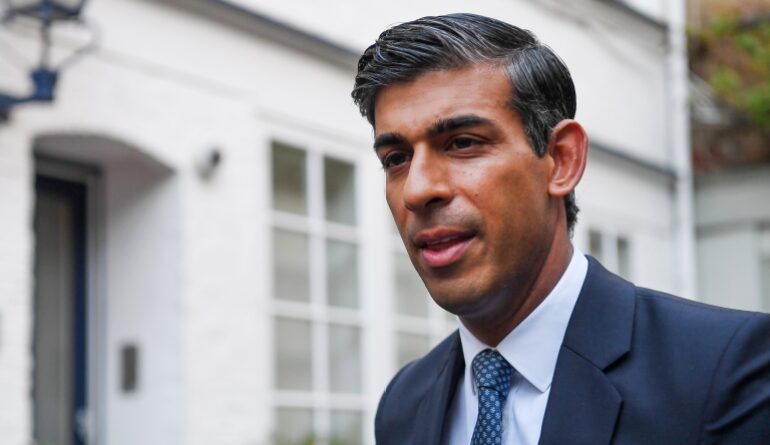
Former British Prime Minister Boris Johnson’s exit from parliament for the holidays that broke the COVID lockdown has sparked feverish speculation about his future and that of the current government.
Johnson announced he was resigning as a member of parliament on Friday, claiming he had been forced out in a row by his political opponents.
The 58-year-old populist politician has been investigated by a cross-party committee into whether he deliberately lied to parliament about parties when he was in office.
In evidence earlier this year, he insisted he had not.
But as the committee prepares to make its findings public, he said they had contacted him “making it clear … they are determined to use the procedure against me to expel me from parliament”.
The privileges committee, which has a majority of MPs from its own Conservative Party, has powers to impose sanctions for misleading Parliament, including suspension.
Normally, suspension of more than 10 working days results in a by-election in the politician’s constituency.
By resigning, Johnson avoids the consequences of a humiliating fight to remain an MP in his north-west London seat of Uxbridge and South Ruislip, where he has a slim majority of just over 7,000.
“kangaroo court”
He denounced the committee, chaired by veteran opposition Labor MP Harriet Harman, as a “kangaroo court”.
“It is very sad to be leaving parliament, at least for now, but most of all I am bewildered and horrified that I could be kicked out, in an undemocratic way … with such blatant bias,” he said.
He claimed the committee’s report, which has not been published, was “riddled with inaccuracies and reeked of prejudice”, adding that he had “no formal ability to challenge what they say”.
His “purpose from the beginning has been to find me guilty, regardless of the facts,” he said.
In response to the resignation, the privileges committee said Johnson “challenged the integrity of the House by his statement.”
Al Jazeera’s Rory Challands, reporting from Westminster, said Johnson, with his move, threw a grenade into the heart of Rishi Sunak’s government, “sending fragments of political shrapnel in all directions”.
“There is speculation at the moment how much damage this will do to the Conservative Party,” he said.
“The government of [Prime Minister] Rishi Sunak stays at this moment very calm. There is no official statement or minister on record.”
The Rishi Sunak government has been silent on the development [File: Andy Rain/EPA]
‘Good deal’
Johnson loyalist Nadine Dorries also resigned as an MP, meaning incumbent Prime Minister Sunak, who Johnson partly blames for his downfall, faces two by-elections as his party languishes in the surveys
Johnson’s ability to generate strong feelings of admiration or loathing was reflected in the reactions to his shocking announcement.
Deputy Labor leader Angela Rayner said the public, struggling with a cost-of-living crisis, had had enough of the “endless Tory soap opera”, while her opposition Lib Dems more petits, Daisy Cooper, said it was “a good delivery”. “.
Patrick Diamond, a former political adviser to the Labor Party, said Johnson’s statement indicated he could be laying the groundwork for a future comeback, particularly if the Tories are soundly defeated in the next election.
“But we shouldn’t be surprised that Boris Johnson is trying to re-insert himself as a leadership candidate,” Diamond, a professor of public policy at Queen Mary University of London, told Al Jazeera.
“The Privileges Committee report contains some damning findings, which may prevent Boris Johnson from returning to British politics.
Diamond added: “But also, I think, it’s important to remember that Boris Johnson remains relatively popular within the Conservative Party and, to some extent, with Tory voters.”
Johnson led the Conservatives to a landslide 80-seat majority in the December 2019 general election on a promise to “get Brexit done”.
This allowed him to bring his separation with the European Union to Parliament, unlocking years of political paralysis.
But he was undone by his handling of the COVID pandemic, “Partygate” and a succession of other scandals that led to a ministerial rebellion in July last year.
He resigned as prime minister and left office last September, although rumors persisted that he wanted another shot at the top job.
Sunak, who was one of Johnson’s top staff when he quit, has been trying to steady the ship since becoming prime minister in October, following the turbulent tenure of his former boss and the short-lived prime minister of Liz Truss.
Johnson’s resignation will likely be seen as his revenge against Sunak, whose Conservatives are trailing in the polls with a general election looming next year.
“When I left office last year, the government was only a few points behind in the polls. That gap has widened enormously,” Johnson said in his letter, attacking Sunak.
Johnson became an MP from 2001 until 2008, then stepped down to serve two four-year terms as Mayor of London. He became an MP again in 2015, becoming Foreign Secretary under Theresa May’s government.
[ad_2]
Source link





